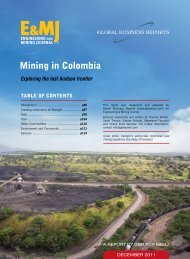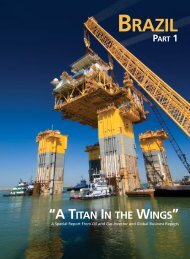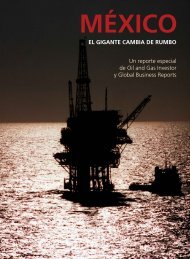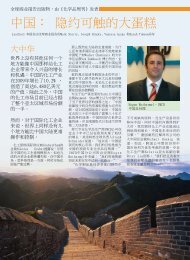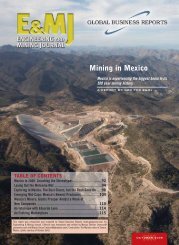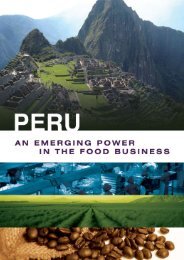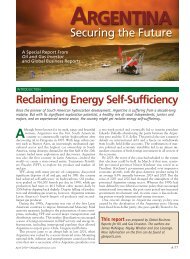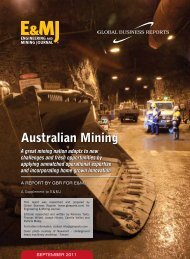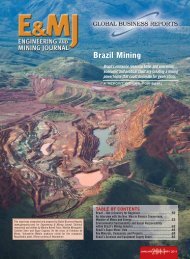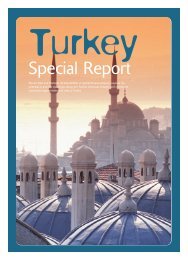Indonesia Mining 2012 - GBR
Indonesia Mining 2012 - GBR
Indonesia Mining 2012 - GBR
Create successful ePaper yourself
Turn your PDF publications into a flip-book with our unique Google optimized e-Paper software.
Heritage Foundation’s Economic Freedom Index has consistently<br />
improved over the period from 2008 to <strong>2012</strong>; although it still sits<br />
slightly below the regional average, it must be remembered that<br />
this is a region that includes Hong Kong and Singapore, ranked first<br />
and second in the world respectively. In the World Bank’s Doing<br />
Business rankings, although <strong>Indonesia</strong>’s position fell three positions<br />
between 2011 and <strong>2012</strong>, its performance in areas such as dealing<br />
with construction permits, protecting investors, and starting a business<br />
has significantly improved since 2004.<br />
On the other hand, <strong>Indonesia</strong>’s position amongst the country’s<br />
ranked in the Fraser Institute’s Annual Survey of <strong>Mining</strong><br />
Companies has been stagnant, remaining around the bottom 10<br />
for the past few years. Indeed, its 2011/<strong>2012</strong> results in this survey<br />
gives a strong indication of both the challenges and potential<br />
that exist; its third-from-bottom ranking for “regulatory duplication<br />
and inconsistencies” speaks volumes about the uncertainty<br />
the 2009 <strong>Mining</strong> Law has introduced, yet its second position for<br />
“room for improvement” shows a distinct hope that this uncertainty<br />
can be addressed.<br />
As part of its strategy for the development of the country’s economy,<br />
the national government has set an ambitious goal of making<br />
<strong>Indonesia</strong> one of the 10 largest economies in the world. With the<br />
mining sector already contributing close to 7% of the nation’s GDP,<br />
the government has designated the sector as one of its cornerstones<br />
in the effort to realize this goal. However, it is difficult to comprehend<br />
how the government hopes to achieve this goal without the<br />
support of the global investment community.<br />
As illustrated in this report, however, many in the global investment<br />
community continue to remain wary of <strong>Indonesia</strong>; uncertain<br />
of the effect that the 2009 <strong>Mining</strong> Law has had and will<br />
have on mining and mineral exploration activities in the country.<br />
While it is certainly true that many international players have entered<br />
the country, are operating in the country, and are prospering<br />
in the country, it is nonetheless the opinion of many that the<br />
<strong>Indonesia</strong>n government must be both more friendly to business<br />
and more definite on what requirements for foreign companies<br />
are. The effect of continued uncertainty is already clear; a declining<br />
number of juniors.<br />
To resolve this issue, it is imperative that the government approach<br />
the mining industry the same way it would any other sector.<br />
Understandably, natural resources are a very touchy topic for any<br />
national government. Nonetheless, in order for <strong>Indonesia</strong> to realize<br />
the true potential of its mining sector, it must adopt a regulatory<br />
framework that is conducive to foreign investment.<br />
Although much criticism has been directed towards the negative<br />
effects that a non-existent junior explorer sector will have on future<br />
metals discoveries, the detrimental impact of this law extends to<br />
the coal space. Indeed, with the fossil fuel sectors growth expected<br />
to continue, the damage caused by the regulatory changes are presently<br />
less pronounced than they are in the metals space. However,<br />
as coal projects get more complicated and capital requirement increase,<br />
then growth will certainly falter if current laws are kept in<br />
place. In short, it is imperative that the government address these<br />
issues before it is too late. If the government fails to pay attention<br />
to the desires of the mining community, then expansion of the sector<br />
will certainly slow down.<br />
Striking the correct balance between protecting national mineral<br />
wealth and inviting foreign investment is a difficult task. However,<br />
given the country’s success in navigating the difficult waters of democracy,<br />
investors should remain hopeful that <strong>Indonesia</strong> will strike<br />
that balance sooner rather than later. When they do, <strong>Indonesia</strong>’s<br />
substantial mineral wealth should attract the world’s attention.<br />
www.e-mj.com E&MJ • JULY <strong>2012</strong> 83



